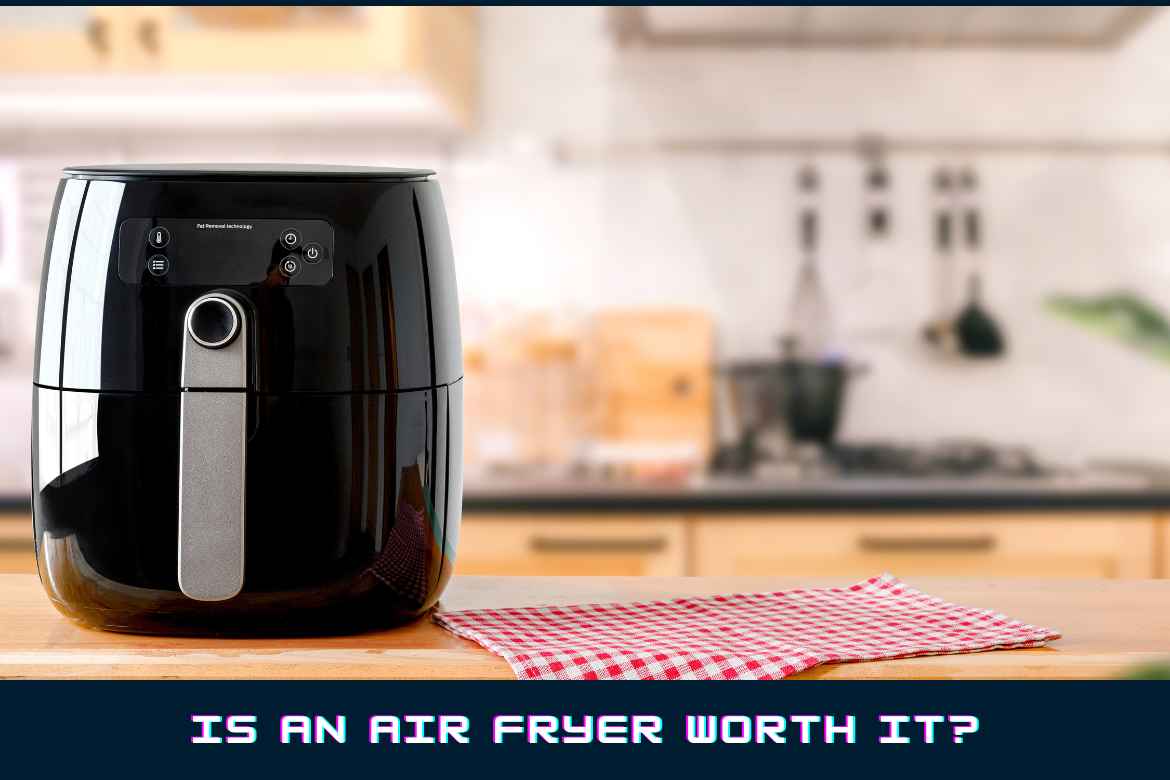Air fryers have become a hot topic in the culinary world, revolutionising the way we cook our favourite fried foods. This innovative kitchen appliance promises the crispy, golden texture of deep-fried delicacies without guilt-inducing greasiness. But what exactly is an air fryer, and is it worth adding to your arsenal of cooking gadgets? Is an air fryer energy-efficient? Is an air fryer easy to clean? And most importantly, is an air fryer worth it? We will discuss this information in detail within the article.
In recent years, the popularity of air fryers has skyrocketed, capturing the attention of home cooks and food enthusiasts alike. This surge in interest can be attributed to several factors, including the desire for healthier eating options and the convenience they offer. The NPD Group conducted a survey that found that in just the past two years, air fryer sales have increased by an astounding 76%. This statistic underscores the growing fascination with this modern cooking method and raises the question: Is an air fryer truly worth the hype? So, let’s dive in and discover the truth behind the air fryer revolution.
Table of Contents
ToggleWhat is an Air Fryer?
1. Definition and Basic Working Principles
To put it simply, an air fryer is a kitchen appliance that offers a healthier alternative to traditional deep-frying. It harnesses the power of rapid air circulation and convection cooking to achieve similar results to deep-frying but with significantly less oil. By circulating hot air at high speeds, air fryers create a crispy outer layer while maintaining the moistness and tenderness of the food inside.
The working principle of an air fryer is relatively straightforward. The appliance contains a heating element and a powerful fan. When you set the desired temperature and cooking time, the heating element heats up the air inside the fryer while the fan circulates the hot air rapidly around the food. This circulating hot air quickly transfers heat to the food’s surface, allowing it to brown and crisp up. As a result, you can achieve that coveted crispy texture without the need for excessive oil.
2. Comparison with Traditional Deep-frying Methods
3. Highlighting the Main Features and Components of an Air Fryer
Air fryers come with a range of features and components that enhance their cooking capabilities. Some common features include temperature control settings, adjustable timers, and pre-programmed cooking modes for different types of food. Many models also come with accessories such as grilling racks, baking pans, and skewers, allowing for versatile cooking options beyond just frying.
The main components of an air fryer typically include a removable frying basket or tray, a heating element, and a fan. The frying basket or tray holds the food and allows the hot air to circulate around it. The heating element provides the necessary heat, and the fan ensures an even distribution of the hot air for consistent cooking too. Some air fryers also incorporate advanced technology, such as rapid hot air circulation or infrared heating elements, to achieve faster and more efficient cooking.
Considering all these features and components, it’s clear that air fryers offer a convenient and efficient way to achieve crispy, delicious results with less oil. So, if you’re wondering, “Is an air fryer good?” The answer lies in its ability to deliver healthier fried foods without compromising on taste or texture.
Advantages of Using an Air Fryer
1. Health Benefits of Air Frying
- Reduction in oil usage: One of the primary advantages of air frying is the significant reduction in oil usage compared to traditional deep frying. While deep frying requires submerging food in a large amount of oil, air fryers can achieve crispy results with as little as a tablespoon of oil or even without any oil at all. This reduction in oil intake can help lower the overall calorie and fat content of your favourite fried foods.
- Lower fat content in fried foods: By using hot air circulation instead of submersion in oil, air fryers can produce foods with significantly lower fat content. Studies have shown that air-fried foods can contain up to 75% less fat than their deep-fried counterparts. This reduction in fat can be beneficial for individuals aiming to maintain a healthier diet and manage their cholesterol levels.
2. Versatility and Variety of Dishes
- Ability to cook various types of food: Air fryers are not limited to frying alone. They offer a wide range of cooking possibilities, allowing you to prepare various types of food. Whether you’re craving crispy fries, juicy chicken wings, or even desserts like apple fritters, an air fryer can handle it all. It provides the flexibility to experiment with different recipes and expand your culinary repertoire too.
- Options for baking, grilling, and roasting: Beyond frying, air fryers can also bake, grill, and roast your favourite dishes. With adjustable temperature settings, you can achieve perfect baking results for cookies, muffins, or even a whole chicken. Grilling vegetables or preparing succulent roasted meats becomes hassle-free with the even heat distribution and controlled cooking environment provided by the air fryer.
3. Time and Energy Efficiency
- Shorter cooking times compared to conventional methods: Air fryers excel at reducing cooking times. This should answer the popular question, “Is an air fryer energy efficient?”. The rapid hot air circulation ensures that food cooks faster than with traditional methods. For example, air-fried chicken wings can be ready in approximately 20 minutes, compared to the longer duration required for deep frying or oven baking. This time-saving aspect is especially advantageous for busy individuals or those looking for quick and convenient meal solutions.
- Less preheating time and faster cleanup: Air fryers eliminate the need for lengthy preheating, unlike conventional ovens. They reach cooking temperatures quickly, allowing you to start cooking almost immediately. Additionally, air fryers are designed with non-stick cooking surfaces, making cleanup a breeze. Most components, such as the frying basket or tray, are dishwasher-safe, minimising the time spent on post-meal cleanups.
Potential Drawbacks of Air Fryers
1. Initial Cost and Investment
2. Limited Cooking Capacity for Larger Families or Gatherings
3. Learning Curve and Adjusting Cooking Techniques
While air fryers are relatively easy to use, there can be a learning curve involved, especially if you’re accustomed to traditional cooking methods. Adjusting cooking techniques, such as timing and temperature, to achieve the desired results with an air fryer may take some trial and error. It’s important to familiarise yourself with the specific features and settings of your air fryer, as well as follow recipes and guidelines tailored for air frying. With a bit of practise and experimentation, you can master the art of air-frying.
- Shorter cooking times compared to conventional methods
While shorter cooking times are considered an advantage, they can also pose a challenge if not managed properly. Air fryers cook food relatively quickly due to the rapid hot air circulation, which means there is a risk of overcooking or drying out certain foods if left unattended. It’s crucial to monitor the cooking process closely and adjust the timing accordingly to ensure optimal results. - Less preheating time and faster cleanup
The reduced preheating time of air fryers can be advantageous in terms of efficiency; however, it may require some adjustments in meal planning and timing. If you’re accustomed to longer preheating times for traditional ovens, you’ll need to plan accordingly to ensure your air fryer is ready to use when needed.
Similarly, non-stick surfaces and dishwasher-safe parts make cleanup easier. However, it’s important to keep in mind that some air fryers may need routine maintenance and cleaning to operate at their best. Understanding the manufacturer’s guidelines for maintenance and upkeep is crucial for the longevity and efficiency of your air fryer.
Final Verdict: Is an Air Fryer Worth It?
After examining the advantages and drawbacks of air fryers, it’s clear that they offer several compelling benefits. The health benefits of reduced oil usage and lower fat content in fried foods make air-frying a healthier alternative to traditional deep-frying too. The versatility of air fryers, allowing for a wide range of dishes beyond just frying, adds to their appeal. Additionally, the time and energy efficiency, with shorter cooking times and faster cleanup, make air fryers convenient for busy individuals.
The decision about whether an air fryer is worth it ultimately depends on personal preferences and lifestyle factors. If you value healthier cooking options, enjoy the versatility of preparing a variety of dishes, and appreciate time and energy efficiency, an air fryer could be a valuable addition to your kitchen. However, if you have a large family or frequently cook for gatherings, you may need to consider the cooking capacity limitations.
Ideally, the decision to invest in an air fryer should be based on your individual needs, preferences, and lifestyle factors. Consider the advantages and drawbacks discussed, as well as your cooking habits, family size, and budget. Research and read user reviews to gather insights from others who have used air fryers. If possible, try borrowing or testing an air fryer before making a purchase to see if it aligns with your cooking style.

